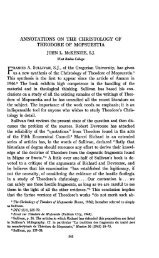SYMBOL, MYTH, AND THE BIBLICAL REVELATION AVERY ...
SYMBOL, MYTH, AND THE BIBLICAL REVELATION AVERY ...
SYMBOL, MYTH, AND THE BIBLICAL REVELATION AVERY ...
You also want an ePaper? Increase the reach of your titles
YUMPU automatically turns print PDFs into web optimized ePapers that Google loves.
<strong>SYMBOL</strong>, <strong>MYTH</strong>, <strong>AND</strong> <strong>THE</strong> <strong>BIBLICAL</strong> <strong>REVELATION</strong> 13<br />
dialectical tension. Neither succeeds in completely eliminating the<br />
other.<br />
Many authors object that a myth, once it has been "elucidated<br />
into a symbol," no longer remains a myth in the true sense of the<br />
term. 23 Others maintain that it remains a myth properly so called,<br />
for it is still accepted as an element of community tradition which in<br />
some mysterious way answers to the deeper aspects of experience. 24<br />
Tillich's term "broken myth" seems to combine what is valid in both<br />
these approaches. While the application of critical thinking represents<br />
a real advance over the merely mythical mode of conception, it does<br />
not fully displace the latter. Even for modern Western man, Greek<br />
myths such as those of Prometheus, Oedipus, and Sisyphus, although<br />
clearly distinguished from historical events, have not lost their psychic<br />
power. They continue to speak to the depths of our existence and<br />
help to reintegrate us with ourselves and our universe. If this be true<br />
even of pagan myths, we must consider seriously whether there cannot<br />
be such a thing as Judeo-Christian mythology.<br />
The very term will seem shocking to those who look upon religion<br />
exclusively as revelation, and upon revelation as a collection of dogmas<br />
set forth in strict propositional language. But if religion is a<br />
dialogue between man and God, and if revelation is the whole process<br />
by which God draws near to man and manifests His presence, one<br />
must keep open, at least provisionally, the possibility that the divine<br />
presence might be apprehended and registered in mythical thought<br />
and expression. Without prejudice to the dogmatic content of revelation,<br />
which is certainly not mythical in the sense described above, it<br />
seems possible to hold that the doctrines are sometimes surrounded<br />
by a penumbra of thinking and speech which deserves to be called<br />
mythical. If myth is ever a bearer of revelation, we should expect to<br />
find that this is true in the Holy Scriptures.<br />
<strong>MYTH</strong> IN <strong>THE</strong> BIBLE: A PRIORI CONSIDERATIONS<br />
Catholics and conservative Protestants have often expressed the<br />
view that myth can have no place in revelation or in the Bible. Billot,<br />
23 So, for example, G. Miegge in Gospel and Myth in the Thought of Rudolf Bultmann<br />
(London, 1960) pp. 118-19.<br />
24 J. Knox, op. cit. t p. 78.
















